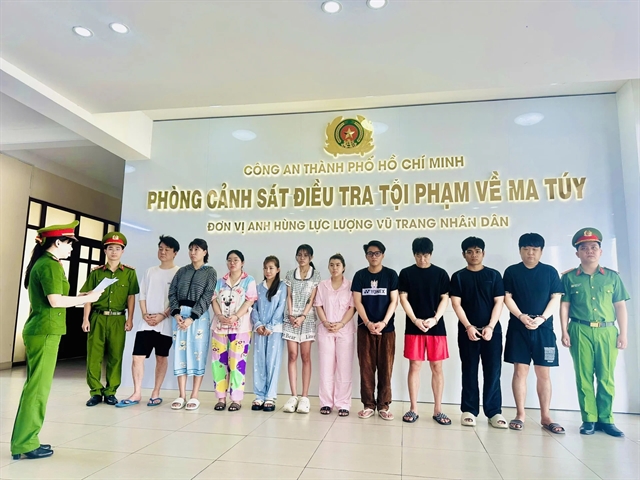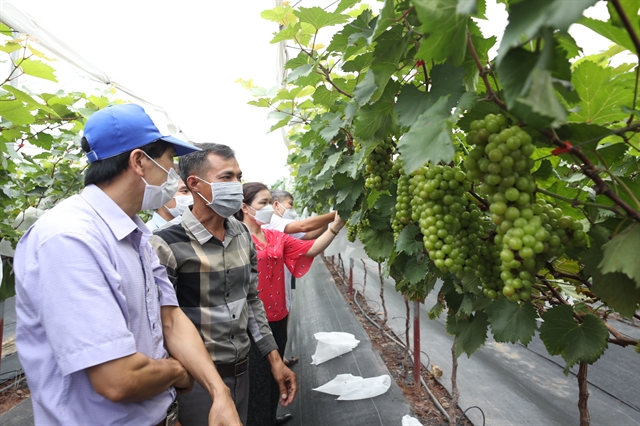 Society
Society


|
| Nguyễn Hữu Lợi (second right) in Đan Phượng Commune, Đan Phượng District grows grapes thanks to the scientific and technical support of Hà Nội Agricultural Extension Centre. Photo courtesy of Hà Nội Agricultural Extension Centre |
HÀ NỘI — Hà Nội has given priority to long-term, high-tech agriculture in order to adapt to climate change.
Director of the Hà Nội Department of Agriculture and Rural Development, Chu Phú Mỹ, said that in order to cope with climate change, the department has directed localities to promote the use of new varieties with high yields and quality, short-growing periods, and adapting to local weather and farming conditions.
The city's goal is to increase the value of high-tech agricultural products by 70 per cent from now to 2025.
Head of the Economic Office of Chương Mỹ District, Trần Thị Thu Hằng, said that many agricultural production models applying science and technology have been developing well in the area over recent years.
Advanced technology including automatic watering, temperature and light-adjusting systems equipped in vegetable, flowers and fruit tree-growing models helped ensure the best growth conditions; and farmers selecting and creating high-yield and quality varieties.
Safe and organic vegetable growing models in greenhouses using hydroponics have been gradually becoming more common.
Hoàng Văn Thám, Director of Chúc Sơn Safe Vegetable Cooperative, said the cooperative was the first in Chương Mỹ District to co-ordinate with scientists to install smart weather-monitoring stations.
With a coverage radius of 15km, the weather-monitoring station can accurately predict temperature, wind speed, and rainfall, to serve as a basis for farmers to develop long-term vegetable-and-fruit caring plans.
Chúc Sơn Co-operative has invested in installing 10 cameras connected to computers and smartphones to help the Board of Directorate easily manage the production areas.
Thanks to the high-tech production, it can collect nearly two tonnes of safe vegetables and fruit every day, regardless of weather conditions.
Hoàng Văn Thám said the cooperative was supplying safe vegetables to four hospitals, two supermarkets, and 15 convenience stores under affiliated contracts with stable prices.
Farmers in Đan Phượng and Ba Vì districts were also actively introducing new quality vegetable varieties, combining high-tech application into production.
It was opening a new direction for local agricultural production, said Nguyễn Đắc Thức, Deputy Director of Thuần Mỹ Agricultural Cooperative, Ba Vì District.
He said he and members have learned about technology through newspapers, books, successful farms, and searched for new fruit varieties that can adapt to climate change.
Thuận Mỹ Agricultural Cooperative planted a trial of grape crops on a 700sq.m area in March 2020. To enhance growth, the co-operative has invested in building a nylon roof and automatic watering system.
Black-grape plants have developed well, with few pests and diseases, a high yield, and farmers can harvest two crops per year in May - June and October - November.
The outlying districts also paid special attention to rice, one of the crops with a large area of nearly 160,000 ha/year, ensuring that production must adapt to climate change, saving water, soil protection, and pest-and disease prevention.
Head of the Economic Department of Thạch Thất District, Hoàng Chí Lượng, said that the district was applying a model of using unmanned aerial vehicles (UAV) to spray pesticides on rice fields.
"It will bring many economic benefits, as well as health and environmental protection," he said.
Director of Hà Nội Agricultural Extension Centre, Vũ Thị Hương, said UAVs have been applied by localities very quickly.
Hương said: "The application of scientific and technological advances to agricultural production, including the use of UAVs, has contributed to accelerating the modernisation of agriculture."
With its active application of science and technical advances to change the agricultural production process, the city is expected to become the science-and-technology centre in agricultural production of the country.
Hà Nội will review, adjust and promulgate policies to encourage agricultural development, especially those involved in high-tech agricultural production with adaptation to climate change, according to the Director of the Hà Nội Department of Agriculture and Rural Development, Chu Phú Mỹ.
The city's agricultural sector was actively searching for new varieties that can adapt to climate conditions, supporting infrastructure investment for high-tech agricultural production associated with product consumption links. VNS